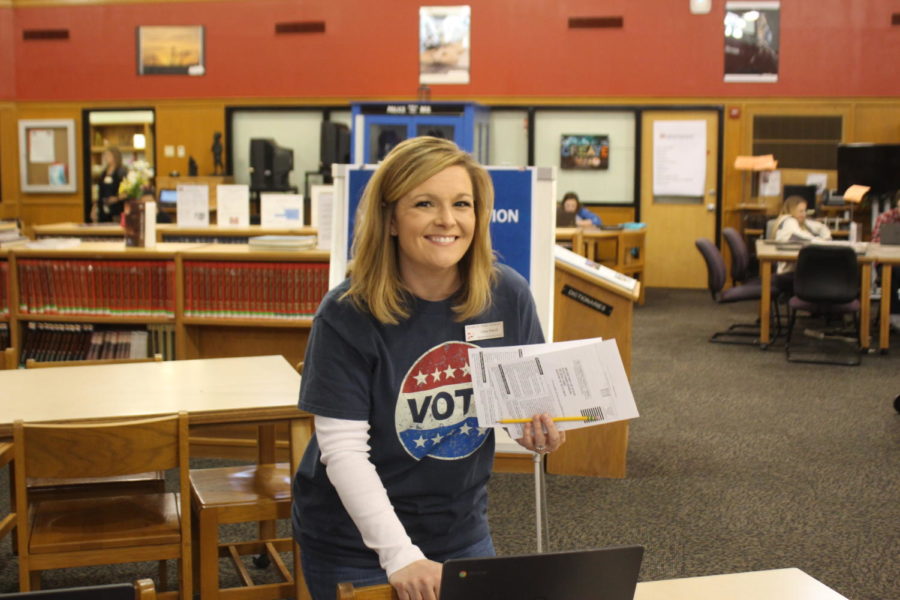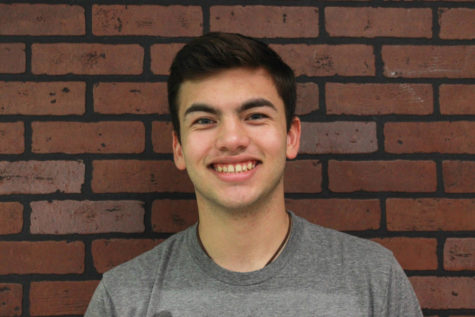To prepare students for the 2018 election cycle, AP Government teacher Carey Petkoff organized a voter registration drive on Jan. 30. Petkoff, with the help of the counselors registered 18-year-old students and any students at least two months from their 18th birthday. In total, Petkoff registered 178 new voters, a turnout that surprised her.
“It went better than I expected because I was worried y’all wouldn’t show up,” Petkoff said. “I was pleased. I thought it was a pretty decent number, especially for this late in the year.”
Registered students can vote as early as the end of February in state and local primary elections. In a primary, voters choose the candidates that will eventually be nominated as the final Democrat and Republican in the general election. Because Texas primary polling numbers are so low, Petkoff says it could only take a handful of votes to tip the scales from one candidate to another.
“Primary voting, I argue, is one of the more important elections because you’re narrowing down the choices to the two people that are going to face off in the actual election,” Petkoff said. “You can have a lot of power. If you don’t think your vote counts, your vote counts more than anything in a primary election.”
She says people often complain they don’t like the final candidates in an election, but that’s mostly due to the fact few people vote in the primaries. Senior Josh Corzatt is not yet sure if he’ll vote in the primary but says it’s important for citizens to be involved in the democratic process. Otherwise, elected officials are not held accountable and have the power to do whatever they want.
“School as we know it now, life as we know it now, has been defined by the choices people have made in politics and in government,” Corzatt said. “So it’s very, very important to be informed and to know what’s going on, so that if you’re passionate about something, you can try and get it through.”
He says there are multiple ways to stay involved in government. Students can participate in debate clubs, political clubs or even volunteer for a local campaign.
“So in terms of getting informed…you definitely can,” Corzatt said. “And in terms of making a difference, anybody can make a difference if they put their full effort into it.”
A proponent of public education, state representative Ron Simmons agrees that students should be actively involved in their government through voting, civics classes and contact with elected officials. In both school and at home, he believes kids should be taught that it’s the people’s duty to participate in elections.
“If you’re going to be governed by people that are elected, then we have a responsibility as a citizen to participate in that,” Simmons said. “Otherwise, you don’t really have any room to complain about things that [you] don’t like…and that doesn’t work in a democracy.”
Both the Democratic and Republican parties in Denton are mainly operated by people age 50 or greater. Simmons says young people must begin to participate in government as millenials are now the biggest voting demographic.
Though a couple years away from voting age, sophomore Caleb Matthews believes it’s important to stay informed on what the government is doing. He says people should take in multiple political opinions, make a decision and “vote [their] conscience.”
“If we can’t assert what we believe in, if we can’t stand up for what we think is right and what we feel, then we’re all just the same,” Matthews said. “If we don’t think for ourselves, then we might as well not think at all.”
Matthews says it’s hard for young people to realize this because they see government as “far off”—they don’t care to vote because the results don’t directly affect them. Still, he believes students should participate in democracy, and to do so in an educated manner, because the wrong decisions can have serious negative repercussions.
“In a few years, we will be getting married, and we will be having jobs and kids and stuff,” Matthews said. “And we need to stay in touch with what’s changing around us, what does affect us.”
To students who have a negative perception of government, Simmons encourages learning and reading from multiple informations sources to develop informed opinions.
“You need to look at all information you get, politically, with a critical eye. It doesn’t have to be a skeptical eye. Not every single person that’s talking to you about politics is lying to you,” Simmons said. “Most elected officials get into this for exactly the right reasons, and they do their very very best.
Petkoff believes it’s “foolish” for young people not to be involved in government as it controls every aspect of life. Right now, lobbyists and interest groups are constantly persuading representatives to do what they want, she says. To counteract this, all people should keep in touch with the government. Not doing so would prohibit citizens from having a voice in what policies are made.
“Just for the love, vote. It is the bare minimum as a citizen of this country that you can do,” Petkoff said. “Just go vote.”








